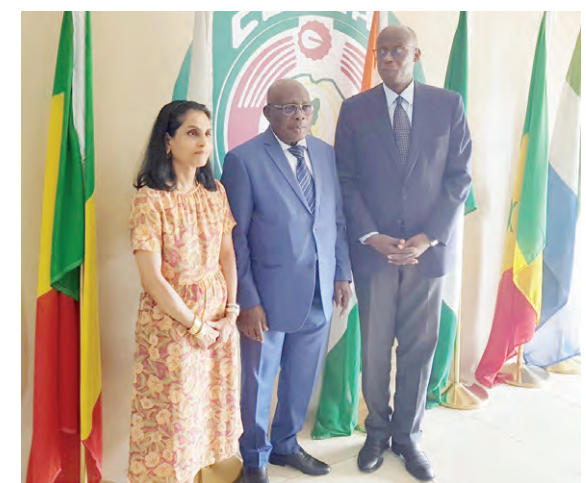ECOWAS Court, UNHCR Move To Protect Refugees, Stateless Persons …C0NTINUE READING HERE >>>
The Community Court of Justice of the Economic Community of West African States (ECOWAS Court) has mapped out strategies in collaboration with the United Nations High Commissioner for Refugees (UNHCR) to protect refugees, Internally Displaced Persons and stateless people within West Africa.
A high-level meeting was held between the United Nations High Commissioner for Refugees (UNHCR) delegation, led by Mr. Raouf Mazou, and the ECOWAS Community Court at their corporate headquarters Friday in Abuja.
Other members of the UNHCR delegation included Ms. Ruvendrini Menikdiwela, assistant High Commissioner in charge of protection, Abdouraouf GNON-KONDE, regional director for West and Central Africa, Herve KUATE, UNHCR senior advisor in charge of liason with ECOWAS and ECCAS , Abuja, Lara SCHOLTERBECK, and Joan Ogu.
The UNHCR aims to ensure that every individual has the right to seek asylum and find a safe haven when fleeing violence, persecution, or war in their home country.
The meeting emphasised the mutual desire of both institutions to enhance their joint efforts towards safeguarding refugees and stateless persons in the community area. Presently, there are approximately 7,337,979 forcibly displaced people triggered by conflicts, violence, and disasters in the ECOWAS Region, comprising of 6,526,928 Internally Displaced Persons (IDPs) and 811,051 refugees and asylum seekers.
At the meeting, the vice-president of the ECOWAS Court, Justice Gberibè Ouattara, who represented the President of the Court, Honourable Judge Edward Amoako Asante, praised the UN’s commitment to protecting human rights globally. He emphasised the need for a stronger partnership between the two institutions, highlighting the significant benefits that such a partnership would provide for the citizens of the community.
He called for the UNHCR to collaborate more extensively with the court in areas concerning access to justice and safeguarding human rights – two mandates shared by both organisations.
He accentuated the importance of the UNHCR as a crucial institution with which the court has maintained an exceptional relationship, expressing readiness to partner with them to strengthen this bond. Additionally, he revealed that the court’s President has given instructions for every case concerning IDPs, stateless individuals, and refugees.
Justice Ouattara also recalled the crucial role of the UNHCR as amicus curiae (friend of the Court), particularly in cases involving refugees and stateless persons. This partnership, according to him, makes it possible for UNHCR to provide technical expertise to affected individuals in legal proceedings, thus strengthening the promotion and protection of human rights in the region.
Ms. Ruvendrini Menikdiwela, the assistant High Commissioner in charge of Protection, praised the cooperation between the court and the UNHCR and indicated that this collaboration would improve the capacity of both institutions to offer support to displaced people, stateless individuals, and refugees who are denied justice for their rights infringements.
She said “Let me commend the court for this incredible collaboration with the UNHCR. It is an initiative that is taken to ensure the rights of refugees, stateless and internally displaced persons within the ECOWAS Community are respected through the decisions of the court.
“Beyond the competence of the court and beyond the state of the ECOWAS Community, we of course carry out our mandate activities regarding protecting the disadvantaged people worldwide. We have presence in 103 countries and over 150 locations and our job is essentially working with the court to ensure that the host governments respect the right of the refugees and stateless persons.
“We present amicus curiae, with which we highlight issues of legal importance towards the right of the refugees and stateless people. We do not intervene individually in individual cases but more on the point of law, which may impact much not only on the individual case but on the interpretation of future cases. This is about easing justice to stateless, refugees and displaced persons.”
During her visit to the ECOWAS Court, Ms Ruvendrini expressed UNHCR’s gratitude for their strong collaboration and pledged support for the implementation of the 2022 Memorandum of Understanding (MoU) between both organizations.
She stressed the significance of the agreement that allows UNHCR to provide expert opinions or amicus curiae interventions regarding cases of importance for the protection of refugees. Ms Ruvendrini encouraged the continual implementation of the MOU and proposed the establishment of an information sharing mechanism between the Court and UNHCR to facilitate closer and more effective cooperation on legal cases affecting the rights of persons of concern.
Furthermore, the UNHCR was present at the ECOWAS Commission on August 14, 2024, to expand partnerships. , the Vice President of the ECOWAS Commission, Damtien Tchintchibidja, highlighted the concerning humanitarian situation in the ECOWAS Region due to conflicts leading to displacement of populations and food insecurity, particularly in the Sahel and Lake Chad Basin Regions. Tchintchibidja affirmed that ECOWAS has committed about 9 million USD from the Humanitarian budget in 2024 to aid refugees, IDPs, asylum seekers and stateless persons. Tchintchibidja urged the UNHCR to support the ECOWAS Commission and Member States to fulfill their Global Refugee Forum (GRF) promises.
>
